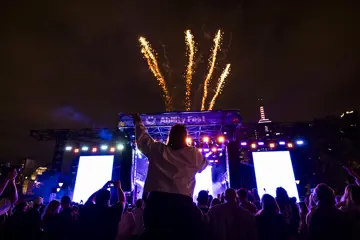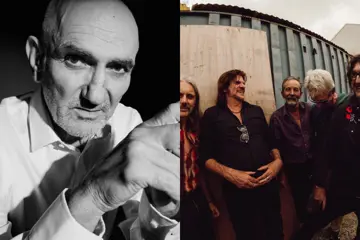Roeingh had been involved in punk bands when he discovered the (acid) house emanating from Chicago, today namechecking Marshall Jefferson's output. In July 1989 this techno humanist, inspired by accounts of UK rave culture, conceived The Love Parade as a "demonstration" for peace, fostering unity through partying in partitioned Berlin, or, as he says, "a reclaiming of the street with our music".
"The fascinating thing is it's still in the heart and still in the mind of the people and we are still talking about that."
The Love Parade presaged the Berlin Wall's collapse, but it also became symbolic of a modern and reunited post-war Germany. The altruistic techno movement liberated young Germans, who'd revel in a previously repressed eccentricity and decadence. Berlin's electronic community forged alliances with African-American innovators in Chicago and Detroit, Roeingh befriending Jefferson. The DIY underground scene capitalised on Berlin's empty spaces for squat parties. As Roeingh says, "This is also like from the '80s things like [Nike's] 'Yeah! Just do it.'"
In 1999, The Love Parade, then "the biggest public brand worldwide known for that culture", attracted 1.5 million. It even went international. There were modest attempts by others to replicate it in Melbourne and Sydney. "It wasn't maybe well organised," Roeingh suggests. But, at home, The Love Parade struggled with funding. In 2005 Roeingh's now partners voted to sell the event to fitness mogul Rainer Schaller, whom he accuses of turning it into a marketing vehicle (and tax reduction). He withdrew. "For me, this was the biggest catastrophe — that this brand is privatised." Regardless, The Love Parade was soon subsumed by local politics, leaving Berlin for the remote Ruhr region. In 2010 it had a tragic coda in Duisburg where, shockingly, 21 people died in a crush. Roeingh laments that there were "so many bad decisions made by the company who owned the brand". But, for The Love Parade's father, its legacy stands. "The fascinating thing is it's still in the heart and still in the mind of the people and we are still talking about that."
Don't miss a beat with our FREE daily newsletter
The DJ remains politically attuned. Germany's welcoming of Syrian refugees has been widely praised, yet Roeingh worries about latent xenophobia — and "people-haters". Then Germany's increasing mass surveillance troubles Roeingh, spooked by Edward Snowden's whistleblowing and, historically, the Stasi's sinister monitoring. The country is rolling out smart meters — but he's not down. "That means they also control how I manage my power in my flat," Roeingh says. "I don't like that at all... No one can enter my flat where I'm living!... If that is not changing, and they digitise money, so it becomes virtual, everything becomes virtual, and I cannot do anything to protect my privacy and my freedom, I will go to a Buddhist monastery and become a monk!"















